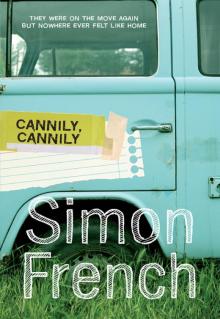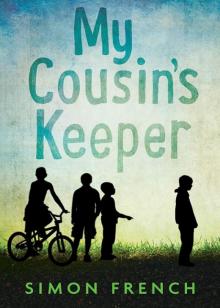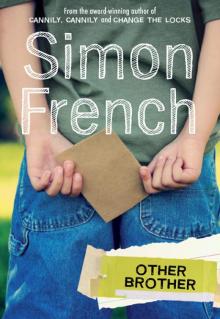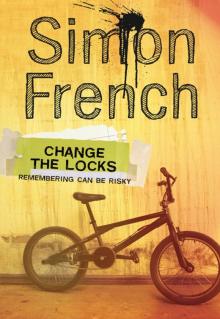- Home
- Simon French
Cannily, Cannily
Cannily, Cannily Read online
Contents
Cover
Blurb
Logo
Yesterday
Chapter 2
Chapter 3
Chapter 4
Chapter 5
Chapter 6
Chapter 7
Chapter 8
Chapter 9
Chapter 10
Chapter 11
Chapter 12
Chapter 13
Chapter 14
Tomorrow
About The Author
Copyright
Dedication
Also By Simon French
Home, he thought grimly. Funny sort of home, a caravan and a kombi with a tent annexe to connect the two.
Trevor is canny. Knowing. Thrifty. Cautious.
But he also wants to belong.
A brilliant novel from multi-award-winning author Simon French.
YESTERDAY
Once there had been a beach.
He could hear the waves pounding on the shore, feel the sand between his toes; he could see himself running into the water. He thought about it often.
Back then he had been much younger, a small child not yet at school, but memories were stubborn sorts of things. Waves, sand and water were mixed up with other recollections – goodnight kisses and stories read aloud, being afraid of the dark. It seemed so long ago sometimes, but he would often dream about it all, waking up expecting the beach to be real.
But they had moved away. The coast had been left for places further inland, for the infinite stretches of bushland, plains and country towns.
He could see a road now, a deep grey stripe in the midst of a formless landscape. Things came into focus gradually: trees appeared, yellow paddocks, misted green hills and on the road, the blue and white kombivan. Closer and closer it came, until he could see in detail the luggage and spare tyres on the roof rack, the dent in the back mudguard, the broken fog light, the caravan in tow. And it all moved slowly, relentlessly over the landscape along the endless road into dusk.
They were moving again. Somewhere behind was a cold southern township where they had stayed for three months. Its memory was already insignificant, its images of place and people blurred. Most distinct was the school, where he’d sat in a brick classroom, in one corner with all the other fruit pickers’ kids. But they were moving to another town now, further to the north. It was like this all the time and with bemused resignation he guessed that the next place would be much the same as the last.
He felt very tired. They had been driving for a long time now, and he began to long for sleep, for peace and quiet.
The kombi’s interior was alive with noise, because every corner of the van rattled. The wind whistled in through a dozen unseen cavities, the loose doors sounded like an orchestra of castanets and above all this was the unending cough-splutter of the engine – a penetrating undercurrent of sound that changed pitch with each change of gears.
He lay awake on the makeshift bunk in the back of the kombi, wedged between built-in cupboards and boxes of belongings. Gusts of night air brushed against his exposed face as the rest of him huddled warm inside the sleeping-bag, and in the distance of the front seat he could see his parents. His mother was curled up asleep, shrouded in blankets, her calm face silhouetted against the dark. And fleetingly, he could see his father’s bearded face reflected in the rear-view mirror.
“You awake, Trevor?”
“Yeah. Kind of.”
“You hungry?”
“No. Will we be there soon?”
“Few more hours. Try and get some sleep, eh?”
They drove on into the night.
The dashboard lights glowed against the shadows, flickering like the dials of a strange machine. The headlights shone into the mysterious distance, hypnotically revealing an infinite road … slowly, very slowly, Trevor drifted into sleep.
When at last the kombi and caravan stopped for the final time that night, he awoke and guessed that they had arrived.
TWO
“I’m going to be a bricklayer.”
He snapped back into the present. “A what?”
“A bricklayer,” said his father with a grin. “You know …”
“You’ve never done that before.”
“Yes, I have. A long time ago, when you were little.”
“Oh.”
Sometimes his parents were an enigma to him, a past beyond clear memory. In his mind he could picture them working among monotonous, endless rows of fruit trees. Before that there were only vague and disjointed images of a place that had come before the seasonal work they now followed.
“The money’s good,” Buckley said with his usual reassuring optimism.
“But how come you’re doing bricklaying now, Dad?”
“A change is as good as a holiday.”
So they had arrived.
Trevor hated caravan parks.
He disliked the temporary, disorganised life, the clutter of caravans and cars and people’s possessions, the dust in summer, the mud in wet weather.
Home, he thought grimly. Funny sort of home, a caravan and a kombi with a tent annexe to connect the two. The caravan was small and incredibly cramped. Cupboards in every conceivable place, a double bunk for his parents, a small gas stove, a fridge, a pint-sized table and chairs for meals, a portable TV sitting on the floor. He always marvelled at the wealth of belongings that came to light each time they unpacked – books, CDs, guitars, a harmonica. There were photo albums too, and an old surfboard that seemed to be permanently lashed to the kombi’s roof rack because Buckley couldn’t bear to part with it.
The kombivan was Trevor’s bedroom, a very makeshift affair. Pictures of soccer teams and bands on the walls and ceiling, eleven years worth of toys and possessions crammed into the cupboards under his bunk, all his clothes in the old tea-chest behind the driver’s seat.
Home. The caravan park seemed empty of other people, a garish plot of land that perched uncomfortably against the backdrop of country township and rural countryside. There was a cluster of onsite caravans nearby and around these the caravan park sprawled, barren, untidy, and held together by the lengths of coloured lights strung between the boundary trees.
“I don’t like it here much.”
“Give it time, Trevor,” his mother said. “You’ve barely been here a day.”
“I know that, but …”
When the weather was warm like this she wore bleached calico or floral cotton dresses that swept about her ankles and often-bare feet. He liked her quietness and her understanding and often thought how strange it seemed, her living in a caravan.
“What are you going to do, though? There’s no fruit to pick.”
She was in the caravan, sorting through cupboards of clothing. “Seem to have accumulated some things that need washing here,” she said absently, then looked at him and raised her eyebrows. “Oh, I’m not going to work, if that’s what you mean. I think it’s time for a break. Your dad seems to be bounding with energy, though.”
“So how long are we gonna be here?”
“Anything up to six months. Building extensions at a bowling club, or something. I still haven’t heard the full story.”
“But what are you going to be doing?” he asked again, not persistently but out of interest. “All that time?”
She shrugged. “Sew. Make things. Read books. Get bored.”
Sometimes a sign would be taped to the caravan’s window: “Dressmaker”, in flowing texta-written letters. This time it hadn’t appeared, because Kath was only able to make money out of it in the larger towns and the more popular caravan parks. But every so often, when the sign was up, she would sit at the sewing machine in the caravan making clothes. It made a change from fruit picki
ng, but depended on a lot of things – her mood, the weather, the money situation.
With the sign for advertising, she made things – shirts, skirts and dresses for tourists and tourists’ children. And sometimes there’d be things for Trevor – shirts, trousers and the patchwork shoulder bag he took to school.
The town lay huddled and largely forgotten by the outside world. It looked like many other country townships, with its tranquil and orderly streets of old weatherboard houses, its small quota of churches and haphazard cemeteries. Once, it must have been an important place – the monumental School of Arts building testified to some sort of past glory. Now there was only the necessary colour of the musty shops and obligatory supermarket to define much of what was left. There were also the trees along the main street, lofty Norfolk pines planted decades before to commemorate the same wars the memorial in the neglected park did.
Behind the town, along the fringes of bushland, the timber mill laboured on as it had done for many years. Amid its complex of open sheds and timber-stacked yard, the conical incinerator rose up like a black pyramid, feeding on scrap wood and sawdust, sending a continual drift of blue-grey smoke into the sky. The mill was the town’s only industry and many of the locals worked there, operating the screaming saws, stacking cut timber in the yard, loading up the semi-trailers with telegraph poles and building beams.
Around all this, bushy hills and open countryside stretched into the horizon.
The highway bypassed the town by some distance, and only a token trickle of tourists made the effort to leave the main road. When they arrived in the town they did so noisily in shiny cars and gaudy, impractical four-wheel drives. They took photos, bought petrol at the two-pump petrol station, downed drinks and food at the RSL Club or the Lindsay Hotel, and then they left.
The people who lived there were few and unchanging. Those who lived along the orderly streets had probably done so all their lives, in houses their grandparents had built. Others lived on outlying farms and came into town maybe once a week for shopping and supplies. The men were stern, practical country people who wore riding boots and akubra hats and talked about crops and stock. Together with the people who lived and worked in the town, they and their wives benevolently regarded the tourists as misguided city fools, and treated change with suspicion. The caravan park at the edge of town was the most recent gesture made to change and tourism, but it was unsuccessful. The few tourists only stayed overnight, and so the single men who worked at the timber mill filled the onsite caravans.
They were in the supermarket.
Methodically, Kath and Buckley explored the aisles, alternately grabbing items from the grocery shelves and referring to a hastily scribbled shopping list.
“Butter?”
“Yes.”
“Eggs?”
“Yes.”
“Tea, milk, bread, orange juice, soap, mosquito coils?”
“Got them.”
Trevor ambled unenthusiastically behind, pushing the shopping trolley. Shopping wasn’t interesting him very much, and he found himself instead taking note of the other people in the supermarket. It was a Saturday morning, busy and crowded. There were townspeople, farmers and their rural wives with their windblown, expressionless faces, and skinny, freckled kids. At a distance, Trevor played silent games with these strangers, allocating each one an occupation and a personality. The people who noticed him watching them returned his apparent curiosity with their own inquisitive looks. It was like being in a foreign country, he decided.
“We need the trolley, Trevor. Can you hurry up?”
“Okay, okay.”
He was gazing into the glass doors of the dairy products refrigerator. In the background of the reflection were the vaguely mirrored figures of his parents. Buckley he could see quite clearly – short and stocky, wide-eyed and casual, a face defined by tousled ginger hair and a straggly beard. Kath’s reflection was less solid, because she kept moving around. But he caught glimpses of her face, thin and girlishly plain, and her long plaited hair, almost the same colour as Buckley’s.
Trevor started to think, sometimes she looks like a schoolgirl, and then stopped short, because he could see his father pulling faces at him.
“Wakey, wakey, Trev. We need the trolley here, not half a mile away.”
“All right, I’m coming.”
“You’re so slow today. What’s wrong?”
“Just tired, I guess.”
At that moment, he had started thinking about school. It was a depressing prospect and an unknown quantity that lurked on the horizon of the Monday to come. He finally decided that it’d probably be like any of the other country schools he had been to, but even that comparison left him feeling uncomfortable. He started to wonder what the other kids in this town would be like.
As they were leaving the supermarket, Kath gave him a bag of groceries to carry back to the kombi. Outside, there was the usual Saturday morning activity about the place – the other people shopping, clusters of dusty cars and utes almost filling the width of the main street. Holding the bag of groceries in one hand, Trevor strolled along the footpath, glancing indifferently into shop windows, straggling behind Kath and Buckley who were walking ahead to where the kombi was parked.
His indifference, however, vanished when he spotted the cluster of pushbikes on the footpath ahead, and the group of kids who stood nearby. Locals, he realised, and paused long enough to observe their almost similar clothing and country-cut hair, the unnervingly perceptive and knowing expressions their faces seemed to have. They’re no older than me anyway, he thought to himself, and took a better grip on the bag of groceries. Shoving his free hand into his shorts pocket, moving his mouth up and down as if to chew on an imaginary piece of bubble gum, he walked past the group in an unblinking but not uncaring silence.
“Bloody tourists,” said a chirpy country voice behind him.
“Yeah, bloody tourists,” came a chorus of other voices. Their talk seemed to follow him all the way back to the kombivan, and his mind smarted at the thought of starting school in this town with those kids. Tough, knowledgeable, ridiculing, country kids …
What’s it going to be like? he wondered, and spent the rest of the weekend thinking about Monday.
THREE
Amid the shelter and green confinement of the town was the school.
Suddenly, he was there; not in the safety of the caravan park, but at the school. Standing on a timber verandah, surrounded by the apparent serenity of ageing weatherboard classroom buildings and towering Norfolk pine trees, he was wishing he could go back to the caravan.
“Breakfast, Trev,” Kath had said that morning.
“I know, Mum.”
“School today …” He hadn’t answered. Grudgingly he had dressed, laboriously he had eaten breakfast. He had taken as long as he could, unconsciously hoping that some miracle would prevent school from commencing.
Public School, 1907. The peeling painted letters had caught Trevor’s eye. They stood out, distinct from the rest of the building on which they had been placed, distinct from the cracked weatherboard and fading paint. From the verandah where he stood he could see the entire school – half-a-dozen identical old buildings placed around a barren asphalt playground, their starkness half-masked by the trees and bushes that surrounded each of them. On the asphalt, in a dozen or so orderly lines, were the children of the school in their grey uniforms. Trevor could only see their backs, because they were all facing a rostrum where a teacher was addressing them over a megaphone. Trevor counted four other teachers, all women, who flanked the assembly lines. The teacher with the megaphone was the only man, tall and heavily built, with an imposing face and short brown hair. Over the megaphone his voice sounded efficient and aggressive. His address was punctuated with commands of “Attention!” and “Stand at ease!”, which the assembled children obeyed with clockwork accuracy.
Public School, 1907. Trevor read it again.
“Some school, huh?” Kath said.
She was beside him on the verandah, watching the assembly proceedings with some amusement. She was wearing one of her long, summery dresses and a pair of leather sandals, and her hair was plaited.
Trevor nodded a reply then frowned, looking down at his feet, at the worn verandah boards and the schoolbag beside him. Kath had sewn it, a patchwork shoulder bag made from scraps of calico, velour and denim. Inside it was an exercise book, a half-eaten biro, his lunch. Beside the shoulder bag was his soccer ball. He’d rummaged around in the cupboards under his bunk that morning and found it. He was still debating whether or not he should have brought it along, but as usual he had, because it came with him every time he started at a new school. Bringing it usually meant someone to play with at lunchtime, and maybe even the benefit of a friend or two.
Friends! he thought then, because the morning assembly had finished, and the children were dispersing in lines towards their various classrooms. He was hoping to remain fairly inconspicuous where he was, but the oldest group of children was coming his way. He could see them pointing at him, whispering between themselves and laughing, and the familiar sick feeling began at the pit of his stomach. He hated first days at school and tried angrily to gaze past the advancing group of kids, guessing that this would have to be his new class, since all the others in the playground had been younger grades. And then, with subdued horror, he realised that the man with the megaphone was following the approaching class. He must be the teacher.
Trevor stood frozen at the verandah railing beside Kath, who seemed to be oblivious to all that he was thinking. The group of kids reached the steps beside them and then filed across the verandah into the adjacent classroom, each of them silently and briefly regarding Kath and Trevor.
The man came up to them then. “Mrs Huon?” he asked, smiling politely. “I’m Mr Fuller, headmaster and senior grades teacher …” He rambled on to Kath about welcomes and about his school and Trevor listened, disliking the teacher for no apparent reason. When Mr Fuller spoke to him it was to say hello only, before taking Kath into a small office beside the classroom.

 Cannily, Cannily
Cannily, Cannily My Cousin's Keeper
My Cousin's Keeper Other Brother
Other Brother Change the Locks
Change the Locks